“Reconciling silence and music in a unique library”: this is how the Rome-based event organization company AtipicA presented on its Facebook page the “Silent Party Experience” event held last Saturday, December 1, at the Angelica Library in Rome. It was a silent disco evening (i.e., a party during which the music is not transmitted through a traditional broadcasting system, but through headphones with which the participants are equipped: everyone listens to the music with their own device): thus, the organizers wrote, it was possible to reconcile the “silence” typical of the library, to the “music” that animates the parties. “By virtue of the respect due to what is a true temple of knowledge,” reads a post presenting the event, “the proposed formula is the Silent Party: participants will be provided with Bluetooth headphones thanks to which it will be possible to listen to music without affecting the sacred silence of the library.” And again, “to the concept of the total experience characteristic of AtipicA is added an extraordinarily valuable element: being surrounded by thousands of manuscripts, ancient texts, historical documents of inestimable value, whose mere presence is already enough to nourish the spirit.”
The event, which began at 9 p.m., cost 30 euros including dinner, or 20 euros with drinks from 10 p.m. The initiative also had several partnerships, including that of Red Bull, and judging by the photos circulated on social media, it was also a fairly successful evening, with the large Vanvitellian Hall transformed for one night into an unusual dancefloor, complete with a bar and bartender dedicated to preparing cocktails.
The Angelica Library was founded in 1604 by Bishop Angelo Rocca (hence the name), and is the first example of a library open to the public in Europe. Established as an Augustinian library (Angelo Rocca was, in fact, an Augustinian) it currently has a collection of 120,000 volumes and has also, since 1940, been home to the Literary Academy of Arcadia. In addition, since 1975 it has been managed by the Ministry of Cultural Heritage. And precisely because of the delicacy of its heritage, its very high historical and cultural value, as well as what appeared to be an improper use of the place, many turned their noses up at it after learning of the event, and negative comments continue to flow on social media. Although, however, this was not the first time the Angelica hosted a private company in its Salon: the closest precedent was the party organized by Gucci in 2016, which was attended by several “VIP” guests of the well-known fashion house. In any case, among the opposing voices was that of the Emergenza Cultura movement, which posted the event’s program on its Facebook page, commenting on it with a laconic and ironic “how to enhance cultural heritage.”
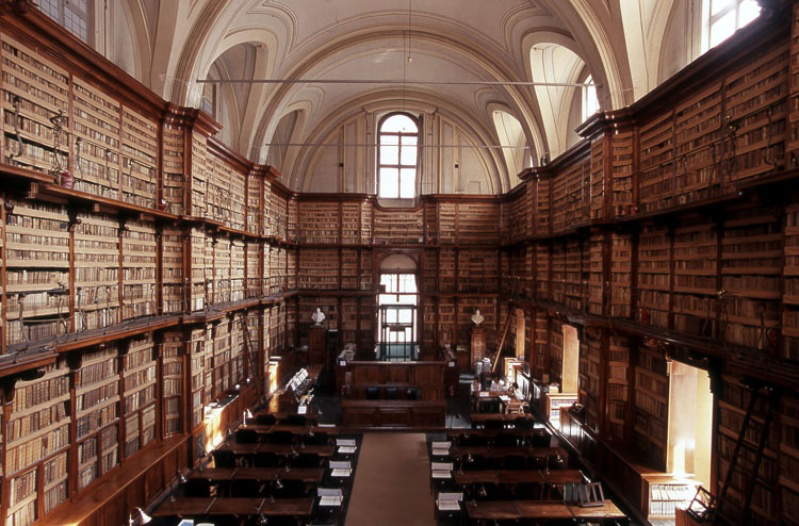 |
| The Vanvitellian Hall of the Angelica Library in Rome |
We reached the director of the Angelica Library, Flaminia Terlizzi, who rejects all the accusations. “We did not sell out anything. The event that took place was not very different from what happens when we shoot scenes for films or when we do book presentations, as we have done for people like Vittorio Sgarbi, Umberto Eco, Corrado Augias or Andrea Camilleri or others, during which there are many more people than those who were present that evening.” Terlizzi points out that the event was attended by about eighty people (a figure that was later confirmed to us by the organizers as well), and above all that “there was no distortion of any kind because everything was done at the closing of the library, both the architectural heritage and the book heritage were not touched in the slightest by the event, which was in any case silent, with low lights as can be seen from the photographs.”
As for the risks to the heritage, Terlizzi points out that "the books that can be seen in the pictures are anastatic copies of no value, which had been displayed only because I, before kicking off this silent party, had proposed an explanation of the Library and its heritage.“ The manner in which the evening was held was also in the spirit of utmost respect: ”the party was held for the first hour and a half in the Vanvitellian Hall, in absolute silence: during the first three quarters of an hour Baroque or at any rate eighteenth-century music was sent into the headphones. At 11:30 p.m. the whole thing came to a close and moved to the ground floor, to an empty, modern hall, and there the party continued until 1 a.m. In the hall there was nothing but this silent listening to music.“ And still, the director explains, ”everything was done with the utmost respect.“ She adds, ”I have been in the Ministry of Cultural Heritage and in a conservation library for thirty-six years, and I do not allow people to teach me what respect for the environment should be, or what conservation should be, because I know it very well."
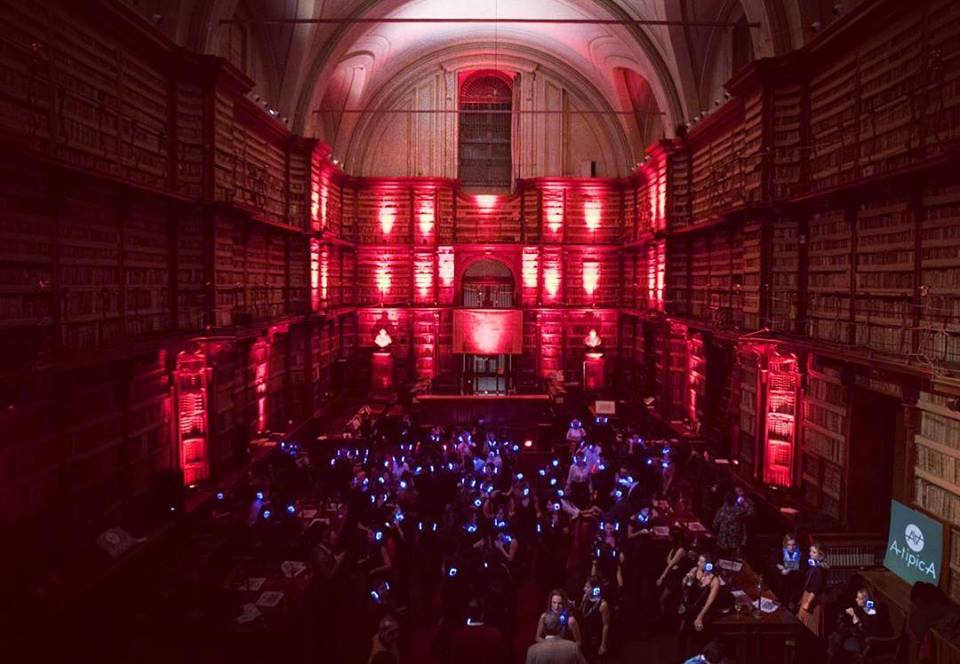 |
| The silent party at the Angelica Library in Rome |
 |
| The silent party at the Angelica Library in Rome |
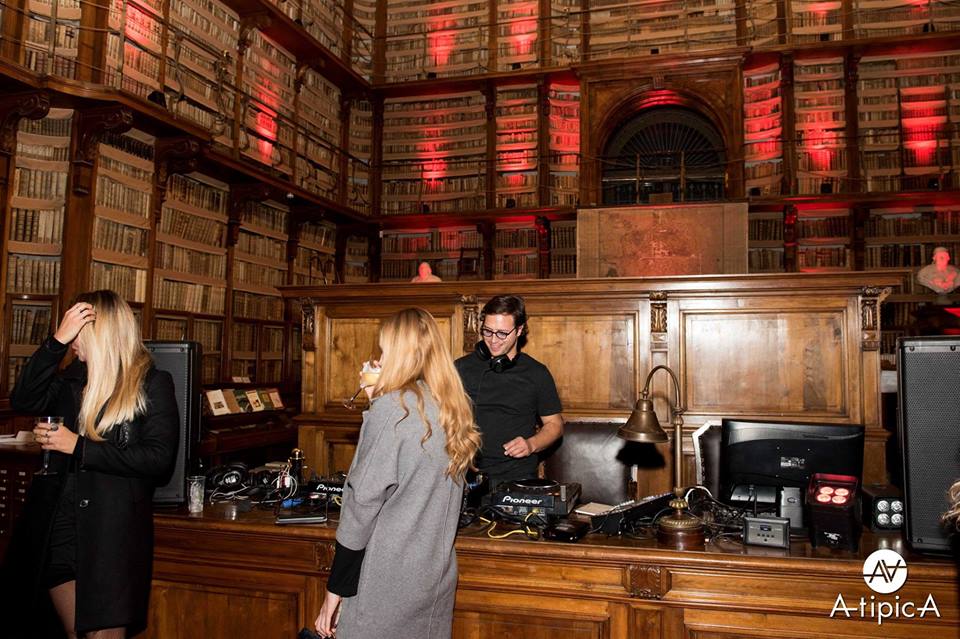 |
| The silent party at the Angelica Library in Rome |
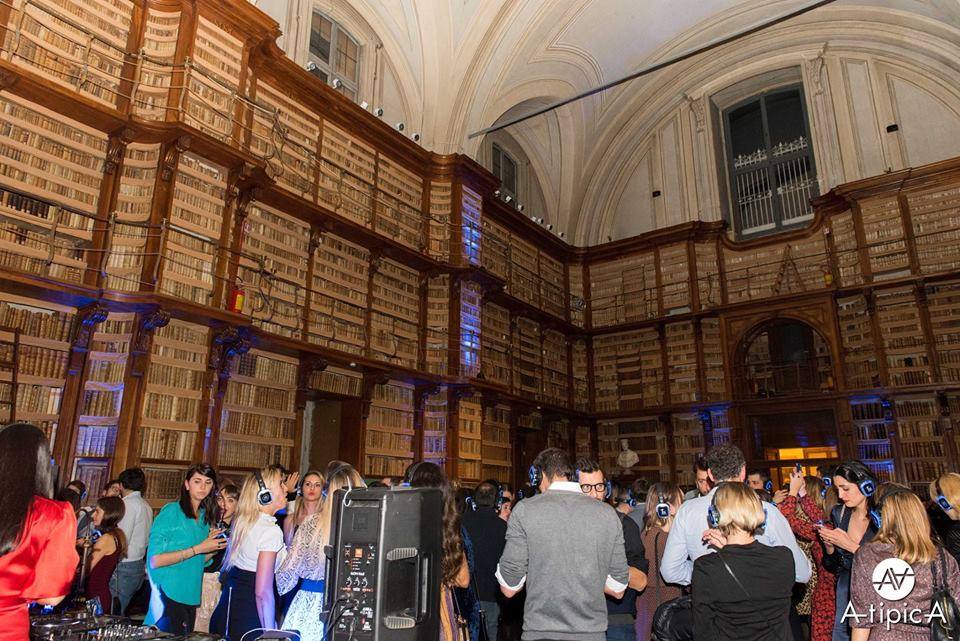 |
| The silent party at the Angelica Library of Rome |
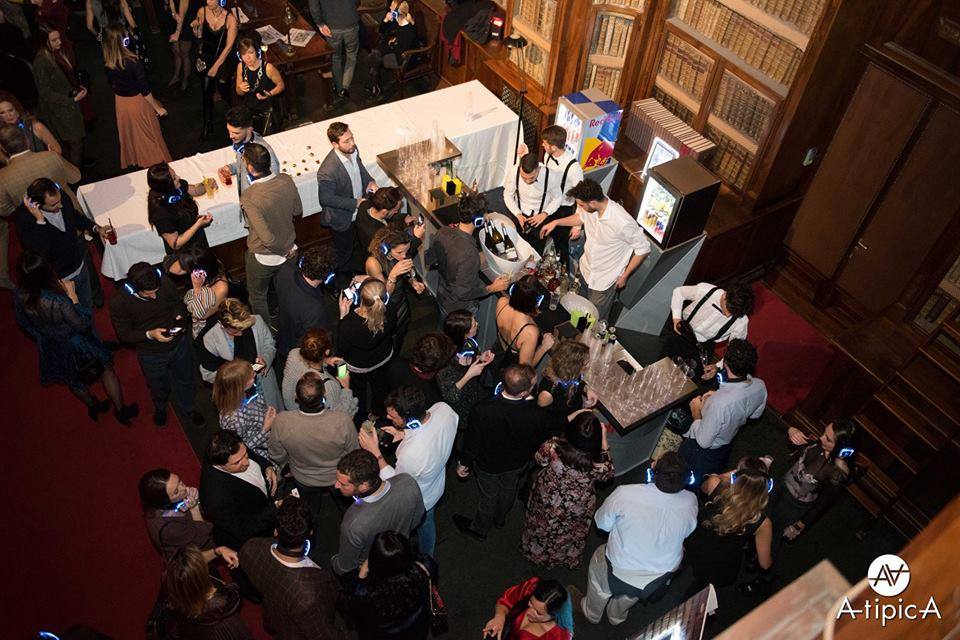 |
| The silent party of the Angelica Library of Rome |
As for the results that the Angelica Library obtained from the silent party, Terlizzi specifies, “as a result of the event, we obtained an important sum, which will be used to restore precious manuscripts that we have owned for quite some time and which were part of the bibliographic heritage of the other important Augustinian library in Rome, the Library of Santa Maria del Popolo.” But there is more than just the “material” result. We asked her as a rebuttal to those who accuse the Library of lending itself to an event distant from its nature, and Terlizzi replied, “I tend to say that the target audience was young people between 27 and 40, the most difficult audience for certain circles to retain: so if even only eight of these people realized what we possess in Rome and the desire came to them to do something different than listening to music, for me it is a success.”
And that the events that AtipicA organizes in historical settings are also meant to raise funds for restoration is also confirmed by AtipicA’s president, Daniele Pallante: “for events of this kind we always fund restoration and offer guided tours. We do this to promote these spaces, which are often not known.” And on the party at the Angelica Library, Pallante first told us of his satisfaction with the outcome of the evening: “we are very satisfied, particularly because the silent party formula worked: we had never used it in historical buildings. It is a very special thing, which worked because the context was apt, the place was unique, and the participants got carried away by the formula.” The whole thing, confirms the president of AtipicA, took place with the utmost respect for the place: “many accused us of not respecting the Library, but they were not present at the event. Moreover, for the first hour there was a background of classical music, in accordance with the place. Only in the second part of the evening did we play disco music. But the important thing anyway is to emphasize that the evening was held in a very controlled manner, the director set many stakes, and we respected all of them. We put everything under protection, we moved the ancient and precious objects, or in general those that could have run the greatest risks, to where no one could have reached them, we took care of the insurance, we respected the attentions that obviously the director asked us, also because we were in a unique place in the world. And all of this, of course, after having made many inspections. I can ultimately guarantee that it was a very peaceful event.”
Warning: the translation into English of the original Italian article was created using automatic tools. We undertake to review all articles, but we do not guarantee the total absence of inaccuracies in the translation due to the program. You can find the original by clicking on the ITA button. If you find any mistake,please contact us.